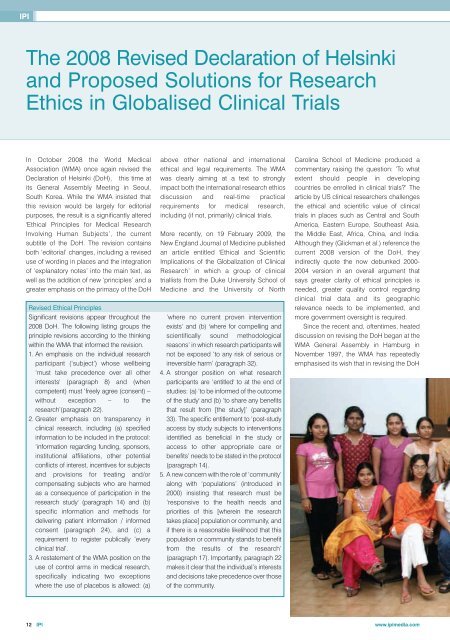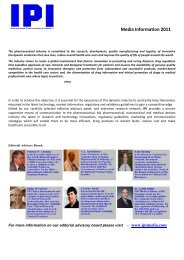IPI - Editorial
IPI - Editorial
IPI - Editorial
Create successful ePaper yourself
Turn your PDF publications into a flip-book with our unique Google optimized e-Paper software.
<strong>IPI</strong><br />
The 2008 Revised Declaration of Helsinki<br />
and Proposed Solutions for Research<br />
Ethics in Globalised Clinical Trials<br />
In October 2008 the World Medical<br />
Association (WMA) once again revised the<br />
Declaration of Helsinki (DoH), this time at<br />
its General Assembly Meeting in Seoul,<br />
South Korea. While the WMA insisted that<br />
this revision would be largely for editorial<br />
purposes, the result is a significantly altered<br />
'Ethical Principles for Medical Research<br />
Involving Human Subjects’, the current<br />
subtitle of the DoH. The revision contains<br />
both ‘editorial’ changes, including a revised<br />
use of wording in places and the integration<br />
of ‘explanatory notes’ into the main text, as<br />
well as the addition of new ‘principles’ and a<br />
greater emphasis on the primacy of the DoH<br />
Revised Ethical Principles<br />
Significant revisions appear throughout the<br />
2008 DoH. The following listing groups the<br />
principle revisions according to the thinking<br />
within the WMA that informed the revision.<br />
1. An emphasis on the individual research<br />
participant (‘subject’) whose wellbeing<br />
‘must take precedence over all other<br />
interests' (paragraph 8) and (when<br />
competent) must ‘freely agree (consent) –<br />
without exception – to the<br />
research’(paragraph 22).<br />
2. Greater emphasis on transparency in<br />
clinical research, including (a) specified<br />
information to be included in the protocol:<br />
‘information regarding funding, sponsors,<br />
institutional affiliations, other potential<br />
conflicts of interest, incentives for subjects<br />
and provisions for treating and/or<br />
compensating subjects who are harmed<br />
as a consequence of participation in the<br />
research study' (paragraph 14) and (b)<br />
specific information and methods for<br />
delivering patient information / informed<br />
consent (paragraph 24), and (c) a<br />
requirement to register publically ‘every<br />
clinical trial’.<br />
3. A restatement of the WMA position on the<br />
use of control arms in medical research,<br />
specifically indicating two exceptions<br />
where the use of placebos is allowed: (a)<br />
above other national and international<br />
ethical and legal requirements. The WMA<br />
was clearly aiming at a text to strongly<br />
impact both the international research ethics<br />
discussion and real-time practical<br />
requirements for medical research,<br />
including (if not, primarily) clinical trials.<br />
More recently, on 19 February 2009, the<br />
New England Journal of Medicine published<br />
an article entitled 'Ethical and Scientific<br />
Implications of the Globalization of Clinical<br />
Research’ in which a group of clinical<br />
triallists from the Duke University School of<br />
Medicine and the University of North<br />
‘where no current proven intervention<br />
exists’ and (b) 'where for compelling and<br />
scientifically sound methodological<br />
reasons’ in which research participants will<br />
not be exposed ‘to any risk of serious or<br />
irreversible harm’ (paragraph 32).<br />
4. A stronger position on what research<br />
participants are ‘entitled' to at the end of<br />
studies: (a) ‘to be informed of the outcome<br />
of the study' and (b) ‘to share any benefits<br />
that result from [the study]’ (paragraph<br />
33). The specific entitlement to ‘post-study<br />
access by study subjects to interventions<br />
identified as beneficial in the study or<br />
access to other appropriate care or<br />
benefits’ needs to be stated in the protocol<br />
(paragraph 14).<br />
5. A new concern with the role of ‘community’<br />
along with ‘populations’ (introduced in<br />
2000) insisting that research must be<br />
‘responsive to the health needs and<br />
priorities of this [wherein the research<br />
takes place] population or community, and<br />
if there is a reasonable likelihood that this<br />
population or community stands to benefit<br />
from the results of the research’<br />
(paragraph 17). Importantly, paragraph 22<br />
makes it clear that the individual’s interests<br />
and decisions take precedence over those<br />
of the community.<br />
Carolina School of Medicine produced a<br />
commentary raising the question: ‘To what<br />
extent should people in developing<br />
countries be enrolled in clinical trials?’ The<br />
article by US clinical researchers challenges<br />
the ethical and scientific value of clinical<br />
trials in places such as Central and South<br />
America, Eastern Europe, Southeast Asia,<br />
the Middle East, Africa, China, and India.<br />
Although they (Glickman et al.) reference the<br />
current 2008 version of the DoH, they<br />
indirectly quote the now debunked 2000-<br />
2004 version in an overall argument that<br />
says greater clarity of ethical principles is<br />
needed, greater quality control regarding<br />
clinical trial data and its geographic<br />
relevance needs to be implemented, and<br />
more government oversight is required.<br />
Since the recent and, oftentimes, heated<br />
discussion on revising the DoH began at the<br />
WMA General Assembly in Hamburg in<br />
November 1997, the WMA has repeatedly<br />
emphasised its wish that in revising the DoH<br />
12 <strong>IPI</strong><br />
www.ipimedia.com



